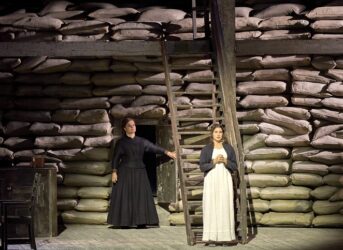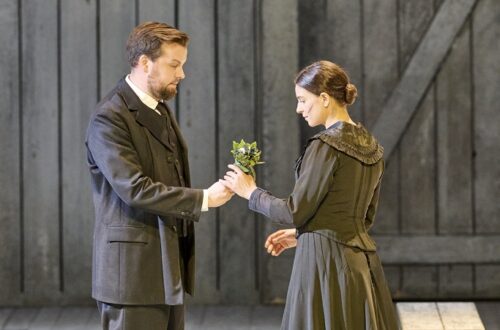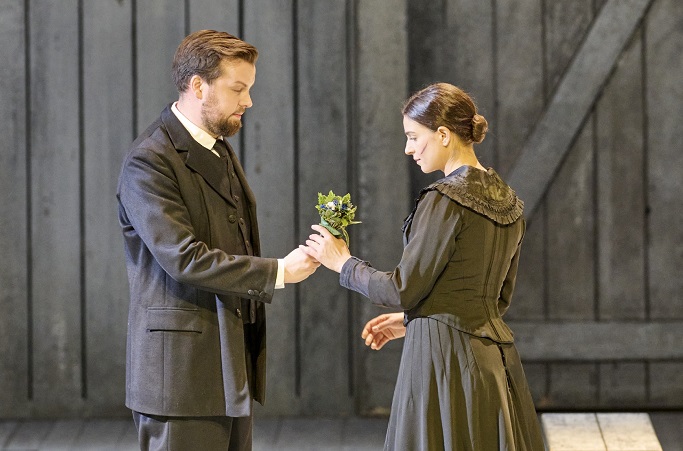 Austria Janáček, Jenůfa: Soloists, Chorus and Orchestra of Vienna State Opera / Tomáš Hanus (conductor). Livestreamed (directed by Jakob Pitzer) from Vienna State Opera, 15.10.2022. (JPr)
Austria Janáček, Jenůfa: Soloists, Chorus and Orchestra of Vienna State Opera / Tomáš Hanus (conductor). Livestreamed (directed by Jakob Pitzer) from Vienna State Opera, 15.10.2022. (JPr)

Production:
Director – David Pountney
Set design – Robert Israel
Costume design – Marie-Jeanne Lecca
Lighting design – Mimi Jordan Sherin
Choreography- Renato Zanella
Chorus director – Martin Schebesta
Cast:
Laca Klemeň – David Butt Philip
Števa Buryjia – Michael Laurenz
Kostelnička Buryjovka – Eliška Weissová
Jenůfa – Asmik Grigorian
Grandmother Buryjovka – Margarita Nekrasova
Mill Foreman – Marcus Pelz
Village Judge – Dan Paul Dumitrescu
Village Judge’s wife – Stephanie Houtzeel
Karolka – Anna Bondarenko
Shepherdess – Daria Sushkova
Barena – Jenni Hietala
Jana – Ileana Tonca
Only the third Jenůfa I have seen and the first by Scottish Opera in Glasgow in 1989 was also directed by David Pountney, though there have been too many years in between for me to remember whether there were any similarities to his current 2002 Vienna production However, I do recall the outstanding cast of British singers in the leading roles: Anne Williams-King (Jenůfa), Graham Clark (Števa) and the much-missed Pauline Tinsley and Alberto Remedios as Kostelnička and Laca.
Janáček’s 1904 opera involves the tangled relationships that are frequently commonplace in TV dramas, as well as centring on the all-too-familiar tightly knit community concealing their all-too-human failings under a veneer of moral rectitude. Števa has made Jenůfa pregnant, though he is a rather feckless drunk who is enjoying life while waiting to inherit a mill when his grandmother dies. Jenůfa’s stepmother (the) Kostelnička – who is variously described as the wife of the churchwarden or the village sacristan (either way it explains her religious zealotry) – demands that Števa should not marry Jenůfa until he has stopped drinking alcohol for a year. (In this production Števa doesn’t appear that interested in Jenůfa.) Grandmother Buryjovka’s other son Laca – a widower like Števa – is also in love with Jenůfa and although unaware of her pregnancy becomes so jealous of her and Števa that he scars Jenůfa’s face, possibly deliberately, or as here in Vienna, seemingly accidentally.
By suggesting she has gone to Vienna (!), Kostelnička conceals Jenůfa’s pregnancy and after the baby is born reveals all to Števa, but he cannot go through with the marriage because he is appalled at her disfigurement and has now become engaged to the judge’s daughter Karolka. In order to avoid all the shame and disgrace – and her own reputation I suspect – Kostelnička drugs her stepdaughter and takes the baby out into the snow and murders it (telling Jenůfa that it had died while she slept for two days recovering from a fever). Laca returns and consoles Jenůfa and they plan the rest of their lives together. When the body is discovered on their wedding day Števa’s shame is revealed and the villagers blame Jenůfa and are about to stone her before Kostelnička – who is riddled with guilt – confesses all. Jenůfa and Laca are left to pick up the pieces of their lives together.
Pountney certainly suggests we are in nineteenth-century Moravia, though until we get occasional bursts of colour from some traditional costumes everything from Marie-Jeanne Lecca is mostly dowdy grey or black and matches Robert Israel’s rather gloomy, silver-grey sets. The curtain rises during the short prelude to Act I and we are inside a mill with a huge central wheel with its gears seen turning to the sound of a xylophone and to the front is a table, two benches and a chair: it is somewhere both imposing and oppressive. After the second act’s doom-laden prelude, we see Kostelnička’s hideaway to be a grain store with sacks piled high at the back with only a couple of doors and the table etc. again.

Act III – possibly the best act of the opera – begins with a jaunty, festive introduction and takes place in an enormous, empty wooden barn fringed by chairs and with a much longer table being readied for the wedding celebrations. When the curtain rises, we see four silhouetted figures: Grandmother Buryjovka, Kostelnička, Jenůfa and the pacing Laca. Jenůfa is in black and it is commented on how she looks ‘like a sober widow’. When members of the wedding party come into the scene they are in more traditional costumes and Karolka (Anna Bondarenko) is a bit of a drama queen dressed in all her finery. Grandmother Buryjovka gives her blessing to the marriage at the very point a child’s body is discovered and Jenůfa reveals it was her baby. To everyone’s dismay Kostelnička accepts the blame suggesting – before being led away – how ‘The Saviour will gaze even at me’ and how she loved herself more than she loved her stepdaughter. In a rare misstep in Janáček’s otherwise, pulsating, atmospheric, folk music-inspired – if rather menacing – score, he conjures up a timpani-led false ending before the brief poignant love duet for Jenůfa and Laca leads to another culmination underscored by Brucknerian brass and timpani. Jenůfa says she forgave him long ago and professes for Laca ‘a love that God, yes God, smiles on kindly!’
Tomáš Hanus’s Jenůfa – as heard through loudspeakers – sounded as if he has as idiomatic feel for Janáček. On the one hand it was a carefully crafted account of the music but one which rarely relaxed the tension during the opera’s three acts. He was supported by an enthusiastic chorus and typically wonderful playing from the Vienna State Opera Orchestra. Asmik Grigorian dominated this Jenůfa and, basically, I am repeating much of what I wrote when she sang the role at Covent Garden. Gregorian shows herself painfully conflicted over her rival suitors and is totally convincing dramatically. She is as vocally assured as we have come to expect from her and is fully capable of heart-rending lyricism at the end, even after three acts of full-on singing. I still await seeing and hearing Gregorian live in the opera house but remain convinced – in her repertoire – she is the leading singing-actor of her soprano generation: Gregorian’s performances are theatrical with little of the mechanics of singing on show.
Eliška Weissová – a new name to me – was initially sternly implacable and autocratic as Kostelnička and her psychological disintegration to guilt-wracked despair was compelling. There was some suitably fervent singing from Michael Laurenz as the dissolute Števa and British tenor David Butt Philip – who seems to get more opportunities abroad than in his home country – was in full-throated voice as his lovelorn and quick to anger half-brother Laca. Janáček’s tessitura is undoubtedly challenging, yet Butt Philip seemed rarely troubled.
This strong casting extended to all the smaller roles: Margarita Nekrasova was a domineering Grandmother Buryjovka, and Stephanie Houtzeel caught the eye as the Judge’s wife making more of the part than I suspect Janáček intended. Musically there was no weak link in this Jenůfa as far as I am concerned.
Jim Pritchard
Asmik Grigorian and David Butt Philip will reunite at London’s Royal Opera House from 21 February 2023 in Rusalka.
